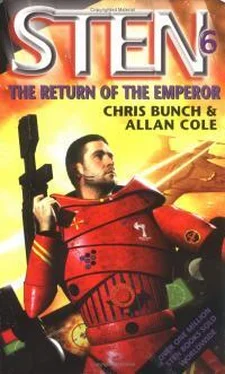Кристофер Банч - The Return of the Emperor
Здесь есть возможность читать онлайн «Кристофер Банч - The Return of the Emperor» весь текст электронной книги совершенно бесплатно (целиком полную версию без сокращений). В некоторых случаях можно слушать аудио, скачать через торрент в формате fb2 и присутствует краткое содержание. Жанр: Боевая фантастика, на английском языке. Описание произведения, (предисловие) а так же отзывы посетителей доступны на портале библиотеки ЛибКат.
- Название:The Return of the Emperor
- Автор:
- Жанр:
- Год:неизвестен
- ISBN:нет данных
- Рейтинг книги:3 / 5. Голосов: 1
-
Избранное:Добавить в избранное
- Отзывы:
-
Ваша оценка:
- 60
- 1
- 2
- 3
- 4
- 5
The Return of the Emperor: краткое содержание, описание и аннотация
Предлагаем к чтению аннотацию, описание, краткое содержание или предисловие (зависит от того, что написал сам автор книги «The Return of the Emperor»). Если вы не нашли необходимую информацию о книге — напишите в комментариях, мы постараемся отыскать её.
The Return of the Emperor — читать онлайн бесплатно полную книгу (весь текст) целиком
Ниже представлен текст книги, разбитый по страницам. Система сохранения места последней прочитанной страницы, позволяет с удобством читать онлайн бесплатно книгу «The Return of the Emperor», без необходимости каждый раз заново искать на чём Вы остановились. Поставьте закладку, и сможете в любой момент перейти на страницу, на которой закончили чтение.
Интервал:
Закладка:
More important than the profits was the potential influence.
The computer was a one-of-a-kind device, with patents so basic that no other corporate being could even contemplate a copy without risking loss of fortune, family, reputation, and well-being to Kyes's battalions of attorneys. From the moment it was first proposed, he knew it would replace every system used by every government in the Empire. And the terms of its sale would be set by him and him alone.
Once installed, his influence would grow as quickly as the newly created wealth. After all, only one firm—his—would be permitted to perform maintenance and periodic upgrading. In short, mess with Kyes and your bureaucracy would collapse. The state itself would quickly follow.
Almost every action of any social being created a record. The first problem was what to do with that record so that others could view it. If there was only one, no problem. It could be put under a rock, the spot marked, and someone with directions could retrieve it at his leisure. But records bred more quickly than cockroaches. Hunter-gatherers rapidly ran out of space on cave walls; scribes filled libraries with parchment; clerks jammed filing cabinets until the drawers warped; and even at the height of the Empire, it was possible for data to swamp the biggest computers.
But that was no longer so severe a problem. More banks or linkups could always be added. Modern systems had gone so far beyond light optics that speed was also no encumbrance.
There was one threshold, however, that no one had ever broken through: How to find one small byte of information hidden in such a great mass. The great library of legend at Alexandria reputedly employed several hundred clerks to search the shelves for the scrolls their scholarly clients requested. Days and weeks might pass before a certain scroll was located. That did not please the scholars, who were usually visiting on a beggar's budget. Their many bitter complaints survived the fire that destroyed the library. And that was in the long time past, when there was not much to know.
In Sten's time, the problem had grown to proportions that would stagger a theoretical mathematician contemplating the navel of the Universe.
Consider this small example: A much-maligned commissary sergeant has been ordered to improve the fare at the enlisted being's club. Morale is sadly sagging to the point that the commander herself is under the scrutiny of her superiors. Suggestions are made—many, many suggestions—that will be carried out. One of the suggestions concerns narcobeer. But not any old narcobeer. The commander recalls one brand—whose name she disremembers—that she shared with the troops on some long-forgotten battleground a century or more ago.
That is the only hint. Nothing more.
The commissary sergeant swings into action. Fires up his trusty computer. And the computer is asked to find that clottin' beer. The list he receives will almost certainly include the brand favored by his commander. But it just as certainly will be buried in a million or more possibilities, with no means of narrowing the search—short of ordering every one and spending several lifetimes letting the commander taste-test each one. Although enjoyable, this solution has obvious flaws.
With Kyes's computer it would be no trouble at all. Because it had been designed to understand that living minds had definite limits. The computer worked in twisted paths and big and little leaps of logic. Any simple explanation of this computer would be in serious error.
However, it was basically taught to think of itself as a chess master, engaged in a game with a talented inferior. The chess master knows she can conceive of many moves, with any number of combinations, well ahead of her opponent. But, in a single game, the amateur is quite likely to win. His limited ability may become a plus under such circumstances. The chess master might as well roll dice, trying to figure out which stupid ploy the dimwit has in mind.
Kyes's brainchild would summon the commander—or at least call up the commander's records. A series of questions would be asked: a short biography, a few details of that long-ago drinking session, for example, and certainly a medical examination to determine the reaction of the being's tastebuds. Voila! The narcobeer would be located and morale boosted. The sergeant and commander would return to good graces. Happy ending through better electronic living.
When Kyes introduced Sr. Lagguth, the chief of the AM2 commission, to his baby, the being instantly fell in love. With such a machine, he could track the path of an errant electron on a flight through a star storm.
The next bit of information, however, made him fall just as quickly out of love.
"Forget the AM2," Kyes said. "It's not important."
Lagguth stuttered that that was the task set for him by the privy council—that the whole future of the Empire rested on locating the Eternal Emperor's golden AM2 fleece. Even when the raid on the Honjo was completed, the resulting AM2 bonus would only stave off the inevitable for another seven months at most—not counting the terrible cost in fuel the Empire was expending to finish the theft.
"Haven't you learned your lesson, yet?" Kyes said. "The Emperor's secret died with him. We're never going to find it. At least, not the way we've been going about it."
Then he told Lagguth what he had mind.
Sr. Lagguth violently protested. He did not say he thought Kyes was mad—although that certainly might have been hinted at. But he did say he would immediately have to report the matter to the rest of the council, and he would have to get their permission to abandon his search and to take up the new one.
Kyes did not explode, or threaten, or call the being all kinds of a fool. Instead, he rang for a clerk, and in a moment or two she appeared, wheeling in a great stack of readouts on a cart. The readouts were copies of the report Lagguth had delivered not too long before to the privy council, the one in which he said that the AM2 would be located within thirteen months.
Kyes strolled about the room while Lagguth stared at the report, considering his many sins.
"Would you like to change your conclusions in that report?" Kyes asked finally.
Lagguth remained silent.
"I had a team of my own people go over it. They found it… interesting," Kyes added. Lagguth's mouth gaped—he wanted to speak—then snapped shut again. What could he say? Every page of the report was fiction. He might as well have said two months, or six months, or—never.
"Shall we try it my way?" Kyes purred.
The logic was impeccable. Sr. Lagguth was convinced.
The old woman was a delight. She wore her gray hair long and tumbling down to her waist. It glowed with health. She had a high-pitched giggle that charmed Kyes, especially since she let it ring out at his weakest jests. Even then, there was no falseness in it. Despite her age, which the investigators estimated at 155, her figure was good and she filled her orange robes in a pleasing manner. From what he knew about such things—if he had been human, Kyes assumed he would have found her still attractive. Her name was Zoran. She was the elected leader of the Cult Of Eternal Emperor, insofar as they had real leadership.
Zoran and her group had been shadowed by his investigators for some time. They were a puzzling lot. Most of them lived ordinary lives and were employed at ordinary jobs. During that time they dressed and mostly behaved like everyone else. The only main difference was their attitude. They were absolutely cheerful beings. There seemed to be no setbacks or disappointments that disturbed them. His chief detective swore that if the immediate demise of Prime World were announced, they would giggle wildly and then go on about their duties. They would probably only add a "Last chance for the word" when they donned their robes, kicked off their shoes, and wandered the streets preaching their peculiar beliefs.
Читать дальшеИнтервал:
Закладка:
Похожие книги на «The Return of the Emperor»
Представляем Вашему вниманию похожие книги на «The Return of the Emperor» списком для выбора. Мы отобрали схожую по названию и смыслу литературу в надежде предоставить читателям больше вариантов отыскать новые, интересные, ещё непрочитанные произведения.
Обсуждение, отзывы о книге «The Return of the Emperor» и просто собственные мнения читателей. Оставьте ваши комментарии, напишите, что Вы думаете о произведении, его смысле или главных героях. Укажите что конкретно понравилось, а что нет, и почему Вы так считаете.











